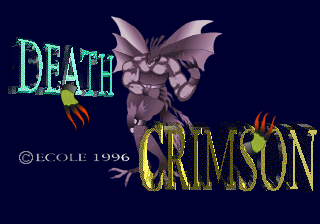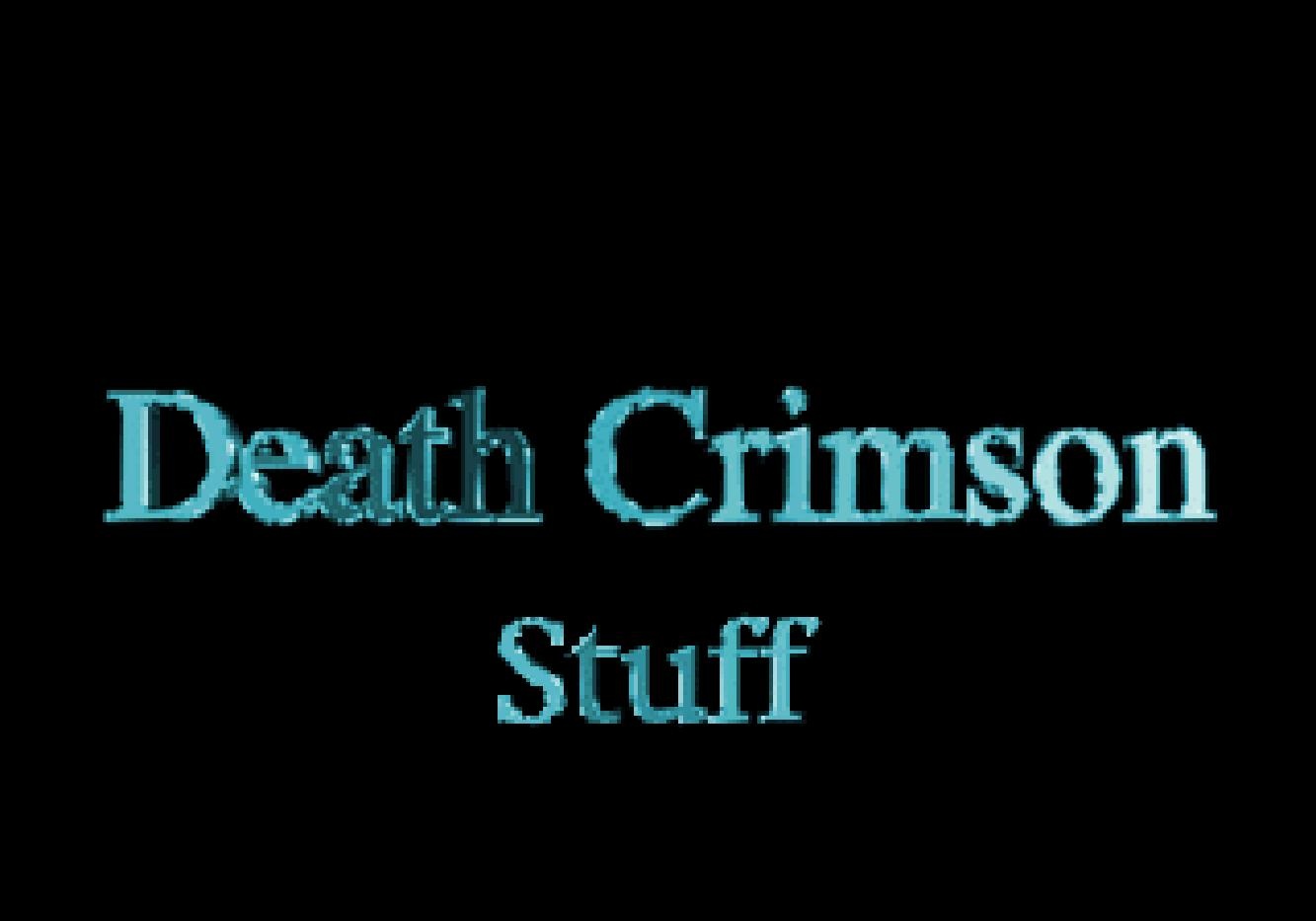Difference between revisions of "Death Crimson"
From Sega Retro
Bonus Game (talk | contribs) |
m (Text replacement - "time=0(\d)" to "time=$1") |
||
| Line 83: | Line 83: | ||
{{tracklist| | {{tracklist| | ||
{{track|data}} | {{track|data}} | ||
| − | {{track|Main Theme|time= | + | {{track|Main Theme|time=2:04}} |
| − | {{track|Start Menu|time= | + | {{track|Start Menu|time=3:00}} |
}} | }} | ||
==References== | ==References== | ||
<references/> | <references/> | ||
Revision as of 18:35, 2 July 2021
| Death Crimson | ||||||||||
|---|---|---|---|---|---|---|---|---|---|---|
| System(s): Sega Saturn | ||||||||||
| Publisher: Ecole | ||||||||||
| Developer: Ecole | ||||||||||
| Sound driver: SCSP/CD-DA (2 tracks) | ||||||||||
| Peripherals supported: Virtua Gun | ||||||||||
| Genre: Shooting[1][2] | ||||||||||
| Number of players: 1 | ||||||||||
| Official in-game languages: | ||||||||||
|
This short article is in need of work. You can help Sega Retro by adding to it.
Death Crimson (デスクリムゾン) is a lightgun game for the Sega Saturn. It is often considered to be one of the worst games for the system.
It was followed by Death Crimson 2 and Death Crimson OX for the Sega Dreamcast.
The Ecole animation logo shown in the game was inspired by a statue from Lake Touya in Hokkaido.
Contents
Story
10 years ago, when he was still in the Marumara Army, he and his two buddies Danny and Greg found some ancient ruins. Inside, they found jewels, ancient books, and a gun called Crimson. The three friends grabbed everything they could and escaped back to their homelands. They never met each other again.
1996 — present day: The KOT syndrome has infected all of Europe. Combat Echizen has become a doctor. He found himself dragged by fate into the town of Saronika where all the citizens have become monsters. Without realizing, he started using the Crimson against them and found it quite effective in dealing damage. The Crimson could also upgrade itself in the midst of battle too. Realizing this gun is connected to the KOT syndrome and the appearance of the monsters, Combat Echizen goes to Limburg University, Coneraato Bridge, Izgit River, and finally to Asshimu Mansion to fight the monsters and reach out to the truth.
History
Critical reception
The game was panned for its terrible graphics, non intuitive calibration screen (it fades to black after you shoot the target and you can’t verify if the gun is calibrated correctly), for the disorienting camera movement and the terrible hit detection.
Legacy
It became considered as "Densetsu no Kusoge" by various retrogamers.
Production credits
- Produce: Y.Manabe
- Total Planning: S.Akasaka
- System Design: S.Sawada
- Game Program: K.Yano
- Graphic Design: M.Yoshimatsu
- Thanks for: T.Umeki, K.Matsui, T.Yamazaki, K.Watanabe (渡辺 邦孝)[3]
- Death Crimson
- Copyright Ecole 1996
Magazine articles
- Main article: Death Crimson/Magazine articles.
Promotional material
Merchandise
Physical scans
| Sega Retro Average | ||||||||||||||||||||||||||||||||||
|---|---|---|---|---|---|---|---|---|---|---|---|---|---|---|---|---|---|---|---|---|---|---|---|---|---|---|---|---|---|---|---|---|---|---|
|
| 30 | |
|---|---|
| Based on 6 reviews | |
Technical information
ROM dump status
| System | Hash | Size | Build Date | Source | Comments | |||||||||
|---|---|---|---|---|---|---|---|---|---|---|---|---|---|---|
| ✔ |
|
117,632,928 | 1996-06-28 | CD-ROM (JP) | T-23202G V1.000 |
Track list
| 1. Data track |
|---|
| 2. Main Theme (2:04) |
|---|
| 3. Start Menu (3:00) |
|---|
References
- ↑ File:DeathCrimson Saturn JP Box Back.jpg
- ↑ 2.0 2.1 https://sega.jp/fb/segahard/ss/soft_licensee2.html (Wayback Machine: 2019-10-02 10:31)
- ↑ https://www.youtube.com/watch?v=lxK2NfqpGI4
- ↑ File:DeathCrimson Saturn JP SSEnding.pdf
- ↑ Famitsu, "1996-08-16" (JP; 1996-08-02), page 1
- ↑ Saturn Fan, "1996 No. 17" (JP; 1996-08-02), page 187
- ↑ Saturn Fan, "1996 No. 20" (JP; 1996-09-20), page 62
- ↑ Saturn Power, "February 1998" (UK; 1997-12-31), page 89
- ↑ Sega Saturn Magazine, "1996-13 (1996-08-09)" (JP; 1996-07-26), page 224
- ↑ Sega Saturn Magazine, "Readers rating final data" (JP; 2000-03), page 17







